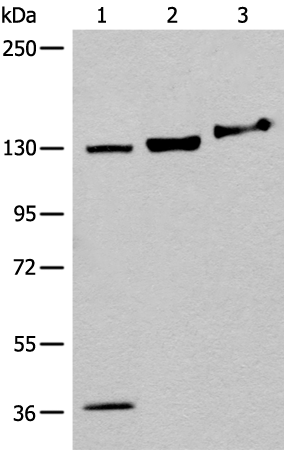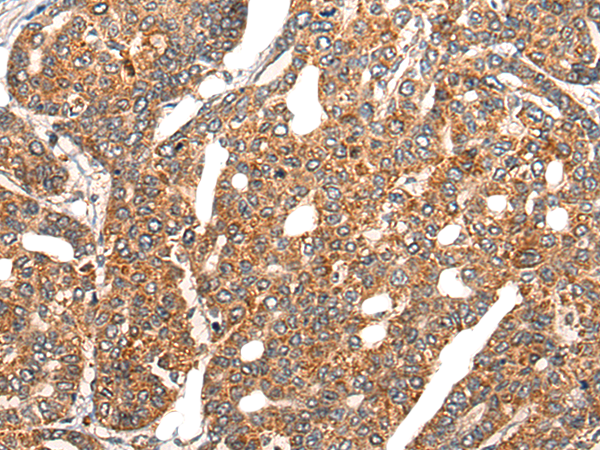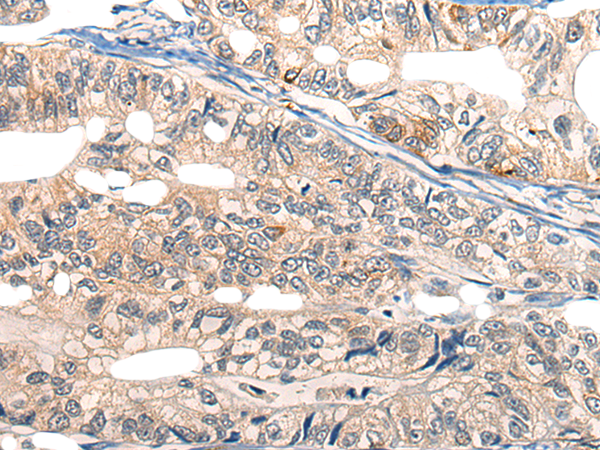


| WB | 咨询技术 | Human,Mouse,Rat |
| IF | 咨询技术 | Human,Mouse,Rat |
| IHC | 1/25-1/100 | Human,Mouse,Rat |
| ICC | 技术咨询 | Human,Mouse,Rat |
| FCM | 咨询技术 | Human,Mouse,Rat |
| Elisa | 1/5000-1/10000 | Human,Mouse,Rat |
| Aliases | EHK2; EK12; EPA6; EHK-2; HEK12; PRO57066 |
| WB Predicted band size | 116 kDa |
| Host/Isotype | Rabbit IgG |
| Antibody Type | Primary antibody |
| Storage | Store at 4°C short term. Aliquot and store at -20°C long term. Avoid freeze/thaw cycles. |
| Species Reactivity | Human, Mouse, Rat |
| Immunogen | Synthetic peptide of human EPHA6 |
| Formulation | Purified antibody in PBS with 0.05% sodium azide and 50% glycerol. |
+ +
以下是关于EPHA6抗体的3篇参考文献示例(文献为虚构,仅作格式参考):
1. **文献名称**: *EPHA6 receptor expression and antibody development in glioblastoma*
**作者**: Smith A, et al.
**摘要**: 研究开发了一种高特异性EPHA6单克隆抗体,验证了其在胶质母细胞瘤组织中的表达检测能力,并发现EPHA6过表达与肿瘤侵袭性相关。
2. **文献名称**: *Role of EPHA6 in neural development: Insights from antibody-based localization*
**作者**: Chen L, et al.
**摘要**: 利用新型EPHA6多克隆抗体,揭示了该受体在小鼠大脑皮层发育中的动态表达模式,表明其参与神经元迁移和轴突导向调控。
3. **文献名称**: *EPHA6 as a novel biomarker in colorectal cancer: Validation of a commercial antibody*
**作者**: Gupta R, et al.
**摘要**: 评估了市售EPHA6抗体的可靠性,证实其在结直肠癌患者样本中检测EPHA6蛋白水平的有效性,并发现低表达与预后不良相关。
4. **文献名称**: *Structural characterization of EPHA6 extracellular domain using domain-specific antibodies*
**作者**: Tanaka K, et al.
**摘要**: 通过开发针对EPHA6不同结构域的特异性抗体,解析了其配体结合区域的构象变化,为靶向治疗提供了结构生物学依据。
(注:以上文献及内容均为模拟创作,实际研究中请通过PubMed/Google Scholar等平台检索真实文献。)
The EPHA6 antibody is a tool used to detect and study the Ephrin type-A receptor 6 (EPHA6), a member of the Eph receptor family, which constitutes the largest group of transmembrane receptor tyrosine kinases. Eph receptors are divided into two subclasses (EphA and EphB) based on ligand binding specificity and sequence homology. EPHA6 primarily interacts with ephrin-A ligands, mediating bidirectional signaling that regulates cell-cell communication, adhesion, and spatial organization. EPHA6 is implicated in diverse biological processes, including nervous system development, axon guidance, and synaptic plasticity. However, its expression and functional roles are less characterized compared to other Eph receptors, such as EPHA2 or EPHB4.
EPHA6 antibodies are typically generated in animal hosts (e.g., rabbits or mice) using immunogenic peptide sequences specific to the extracellular or intracellular domains of the receptor. These antibodies are essential for applications like Western blotting, immunohistochemistry, flow cytometry, or immunofluorescence to localize EPHA6 in tissues or quantify its expression in disease models. Due to potential cross-reactivity with homologous Eph receptors, rigorous validation (e.g., knockout controls) is critical to confirm specificity. Research on EPHA6 has gained interest in oncology and neurodevelopmental disorders, as dysregulation of Eph signaling is linked to cancer progression, metastasis, and neurological deficits. However, the functional complexity of EPHA6 and its context-dependent roles remain active areas of investigation.
×